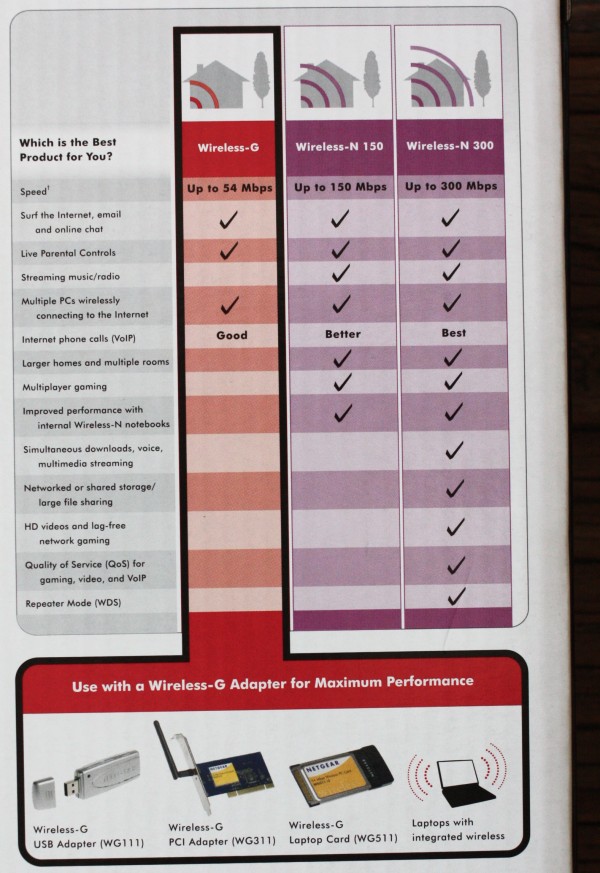
So I had to go pick up a new wireless router yesterday, and picked up a plain $35 Netgear one. Checking the back, I noticed this amazing, amazing panel, full of the most misleading garbage I’ve seen in a long time. Netgear should be ashamed of themselves. Let’s just take a look at what’s wrong with this panel.
- First, there’s no indication where this information is coming from. They’ve literally just made it up, and there’s no indication that this is the case. Sure, advertising has a fair amount of fantasy, but this is next to the configuration and features.
- “Which is the best product for you?” seems to be their excuse for fraudulently putting check marks next to features. They also feel justified in recommending their most expensive 300Mbps router, even though the average broadband connection is likely to be under 10Mbps and most of these tasks are possible at a tenth of that. They know no one is going to read these check marks as recommendations, but as capabilities and limitations. There’s no indication that they are not providing technical information.
- Any tech-savvy person (which is to say, probably not your average shopper, at whom this panel is aimed) will be suspicious when “streaming music/radio” does not receive a check mark. The bandwidth required is obviously so microscopic that any router from the last 15 years could handle a dozen streams.
- “Good,” “better,” and “best” — what do these mean? They seem to be implying that having an enormous bandwidth ceiling on your wireless local network will improve call quality, when VoIP is, like streaming music, incredibly low-bandwidth.
- Multiplayer gaming, now there’s a laugh. How many of you remember playing games over dial-up and DSL, browsing hundreds of servers in Tribes or Half-Life to find a ping under 100? Not only is multiplayer gaming performance not in the slightest limited by your home wireless connection (unless you’ve got extreme packet loss), but even if it were, wireless routers have handled it perfectly well for a decade, and this one is no different.
- Now you get to the woollier things, like “simultaneous downloads” and “large file sharing,” which according to this little checklist are not possible on a 150Mbps 802.11n-compatible router. You can judge for yourself the truth of these capabilities.
Your average walk-in to Best Buy is already confused enough by the vast selection of devices for every conceivable purpose. They don’t need trash like this (expected as it may be) confusing them even more. It’s stuff like this that gives people reasons to dislike technology in general, to distance themselves from technical knowledge of their computers and phones.
I’m sure this is a great router. The bits that made up this post went through it just fine. And some of these services may in fact be improved with a better one. But this is an dishonest, disrespectful, and of course very inaccurate representation of the differences between routers. I implore Netgear to abandon this offensive and predatory method of scaring customers into upgrading.
Note: Just so we’re clear, I don’t think Netgear is the only company doing this, nor do I think this is anything new. Nor do I think (or imply) there is no difference between G and N. I just felt like pointing out how absurd this label is.